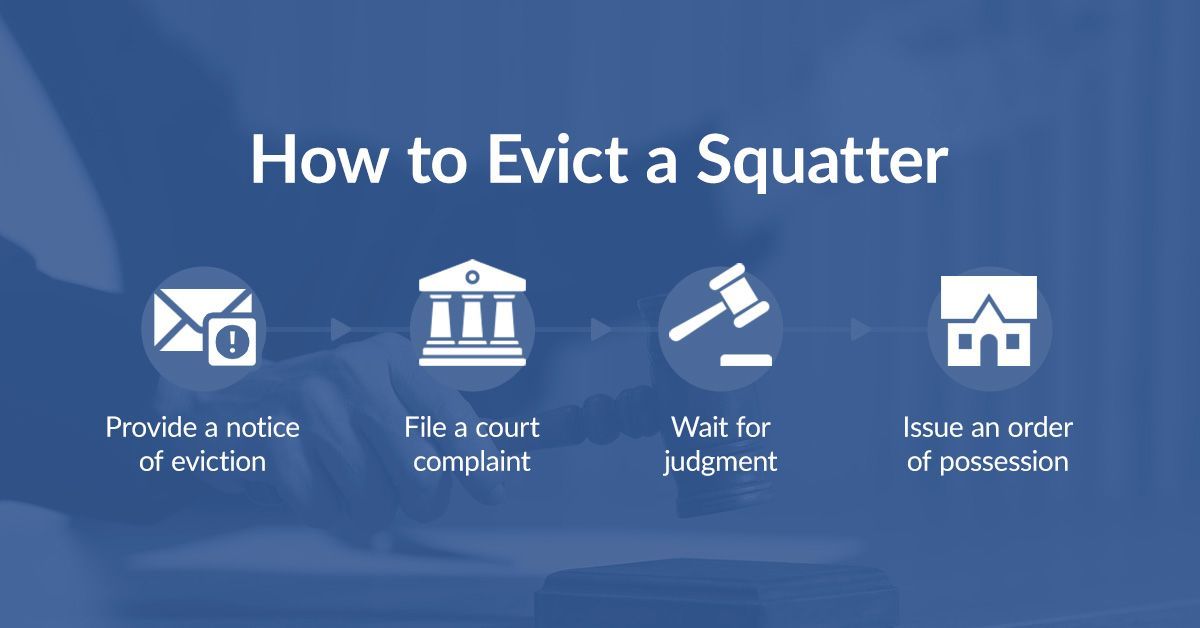Squatters' Rights in Pennsylvania

It can be stressful to have people occupy your property without you knowing, especially if they’ve been doing so for years. Even though it’s tempting to evict these individuals yourself, there is a legal process to follow. Squatters have rights in Pennsylvania, and following the laws increases your chances of getting your property back.
What Is a Squatter?
Squatters occupy properties without permission for some period, which could be weeks, months or years. They do not have tenancy and have not signed a lease agreement. Vacant, neglected and abandoned properties are susceptible to squatters.
Although squatters are typically trying to own a property that’s not theirs, some squatters may have mistakenly thought they had a legal right to the property. For example, they may have been gifted the property by someone who didn't have the right to give it away.
Trespassers vs. Squatters
Although trespassers and squatters are similar in the sense that both enter properties they don’t own, trespassers only stay for a short period and don’t intend to claim the property. Squatters stay for an extended time. For example, a person trespassing on your property may plan to tamper with your equipment or hunt on your land, which means they might leave after a day or two. Squatters can stay on your property for years.
Each jurisdiction has varying laws on trespassing and squatting. Trespassing can be treated as a criminal or civic offense, while squatting typically starts as a civic offense but may become a criminal offense, depending on the length of stay.
What Are Squatters' Rights?
Squatters' rights allow persons to gain ownership of a property they have lived in for a specific period. If they meet the time and other requirements, they can successfully claim the property. How long squatters must stay on the property to gain ownership varies from state to state. There is no federal law that governs these rights.
To increase the chances of ownership, squatters may need to:
- Live in the property continuously for a specific period.
- Gather evidence of their claim through property tax receipts and other documentation.
- File a quiet title action, a lawsuit that “quiets” other claims to the property.
Some states require squatters to have a color of title — a document that seems to grant ownership but is flawed in some way.
Does Pennsylvania Have Squatters' Rights?
Squatters in Pennsylvania need to have lived on the property for 21 years to gain ownership. However, the state does not require property tax payments or a color of title. Under the adverse possession legal doctrine, squatters must meet five requirements:
- Squatters must continuously occupy the property uninterrupted for at least 21 years.
- Squatters must use the property without permission from the landlord.
- Squatters must use the property exclusively, meaning they don't share it with someone who has a right to own it.
- Squatters must use the property as it was intended to be used.
- Squatters must openly, not secretly, use the property.
Temporary permission from a landlord can prevent squatters from claiming adverse possession. Any presence of a lease can also prevent hostile ownership. Note that agreements can exist verbally or in written form, but written contracts are an easy proof of agreement.
Why Do Squatters Have Rights?
Generally speaking, squatting is considered illegal. However, adverse possession laws are put in place to avoid neglected properties and to encourage landlords to productively use their land. What’s more, these rules discourage vigilante justice, which is an inhumane and unlawful way of evicting squatters.
When you find persons squatting on your property, it’s best to evict them as soon as possible to avoid them being eligible for adverse possession. Although it can be hard for them to meet the requirements, it’s not entirely impossible. For instance, in 2008, Steven DeCaprio from Oakland fixed up and lived in an abandoned house in the city. He successfully sued for occupancy and ownership through adverse possession.
How to Evict a Squatter

As a landlord, you have the right to evict squatters through law enforcement. You cannot evict squatters yourself. You also cannot change property locks to prevent access to the property, and you cannot threaten squatters to leave the property. Evicting squatters yourself is called “self-help eviction” and is prohibited.
Here’s the correct squatter eviction process:
- Provide a notice of eviction: Write an eviction notice, giving the squatters 10-30 days to leave voluntarily in Pennsylvania. You must give the notice personally, leave the notice at the main building of your property, or post the notice conspicuously on your property.
- File a court complaint: If a squatter does not leave the property within the time frame of your eviction notice, you should file a complaint in court. The complaint should ask for possession of the property and may ask for payment for damages. The court will require you to attend a scheduled hearing. Each court will have slightly different rules for these complaints, so check your local rules for more information.
- Wait for judgment: You and the person aiming to claim your property will have a chance to present your case. Prepare your documents, photos, records, emails and other evidence that can help your case. You may bring your own lawyer. Within a few days, the judge will make their decision.
- Issue an order of possession: If you win the case, you still cannot evict the squatters yourself. An order of possession requires the persons living at your property to vacate the area within a certain period, usually 10 days. Otherwise, they can be forcibly evicted.
If squatters leave their possessions behind, you can notify them to retrieve their belongings, which they should do within 10 days. The squatter may also request that you keep their belongings for up to 30 days. However, they will be responsible for related costs. If you cannot contact the squatter for their belongings, you can dispose of the items.
It’s best to follow the correct eviction process. People squatting on your property have rights, and if they believe these rights were violated, they can file a complaint. This can lead to messy lawsuits and may even result in you losing your property.
How to Avoid Squatters in Pennsylvania
Evicting squatters can be a tiring, costly and long process. It’s always better to try to avoid them in the first place.
Here are ways you can do so:
- Regularly monitor your property: Regularly monitoring your property helps you spot trespassers and squatters right away. This means you can evict them quickly, reducing the chances of a hostile takeover.
- Ensure tenants know you and one another: If tenants know you and one another, they may tell you if they find any suspicious activity on your property. Squatters need to openly use your property to claim it through adverse possession. This will likely fail if neighbors know one another.
- Keep your property well-maintained: Squatters can fix up an abandoned property, which could increase their chances of claiming it. Squatters are less likely to target well-maintained properties.
- Consider property management companies: Managing your property can be challenging, especially if you own multiple properties. A property management company can help you out by managing one or all of your properties.
- Screen tenants: Tenant screening can help ensure full occupancy so that there are no empty properties for squatters to occupy.
Make Property Management Easy With AHPM
American Heritage Property Management (AHPM) is a full-service property management company — the largest in Central Pennsylvania. Having been in business since 1981, you can trust that you’ll be getting services from experts in the industry.
We can help you manage your properties and screen tenants by performing credit reviews, criminal history checks, employment verifications and more. We also prepare lease agreements, ensure rents are paid on time and offer 24/7 emergency maintenance services. Let us help you take the stress out of the work and ensure your properties are in top shape. Contact us today to get a free quote!





